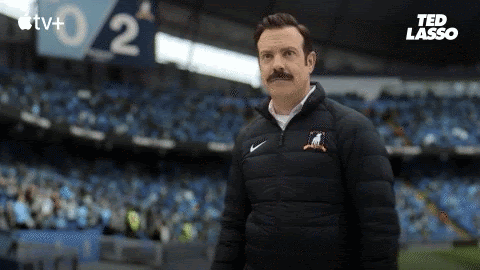"Lasso"ing Self-Efficacy
Over the 3 seasons of Ted Lasso, Ted has shown various situations where self efficacy comes into play. I want to focus on Season 1 Episode 4 of the series. Before we get into that, I want to explain the concepts that I will be touching on in this blog post.
The first is self-efficacy. According to Bandura, ".....self efficacy is defined as one's judgement of how well (or poorly) on will cope with a situation, given the skills one possesses and the circumstances one faces" (Bandura, 1986, 1993, 1997) Self-efficacy really gives substance to goals and goal striving because if you do not have have a thought of how well you will do with a certain task, then the likelihood of you attempting the task or completing the task is very minimal. Throughout the entire series, Ted constantly exhibits how high his self-efficacy is with various situations he comes across.
The next concept I want to touch on with this episode is growth mindset. According to a journal publication by Betsy Ng, "Growth mindset is the belief that intelligence can be nurtured through learning and effort.." (Ng 2018). Inherently, the entire show is a great representation of growth mindset because Ted goes into this situation with AFC Richmond not knowing anything but believing that he can continue to learn in order to get better.
The episode starts out with two of the players on the team having a disagreement due to them having different personalities and how the treat the other players on the team. This disagreement turns physical and Ted steps in to tell them to stop. Once the team clears, he sets the goal clearly by saying he has to find a way to make those two come together as teammates for the sake of making the team more cohesive.
Self-efficacy comes into play because at no point does Ted believe that he cannot make this happen. Self-efficacy does not just happen out of nowhere. There are a few places self-efficacy can come from. In this particular instance, it is my belief that Ted gets a good bit of his self-efficacy from verbal persuasion. His friend, Coach Beard is always pushing him and affirming that he can accomplish the goal he sets. Another is past behavior. Ted has, so far in the series, gotten people to listen to him and his ideas in the past. So that adds to his high self-efficacy.
Ted sets the goal for the players to end up at the same table at a gala they have all been invited to. He achieves this because he believes that he has charm, social capital, and kindness that translates into a rapport with the gala host. He would be correct because the gala host does not care if they move to the same table. This is a good example of Ted's self-efficacy at work.
At the gala, Ted sets the goal for the players to start talking and getting everything out on the table. They both refuse to do that in a civilized manner and it ends with one player leaving the table. Ted, again, believes that because of his personality traits, he can at least get through to the remaining player at the table to try and get a truce between the feuding men.
At the end of the gala, the older player of the two feuding men actually takes Ted's advice into consideration and goes to make a truce with the younger player.
Ted's high self-efficacy truly helped in this situation and allowed for him to bring his team together once again. Because of this, his high self-efficacy will continue to get higher due to the success of this event.
This also leads to a growth mindset for Ted as well. He goes into every situation wanting to learn how to do better just for his own enjoyment (intrinsic value) rather than to get some reward for it (extrinsic value). His entire stint at AFC Richmond and how he handles the players is attributed to his growth mindset and his ability to be flexible in his intelligence about these things.



Comments
Post a Comment